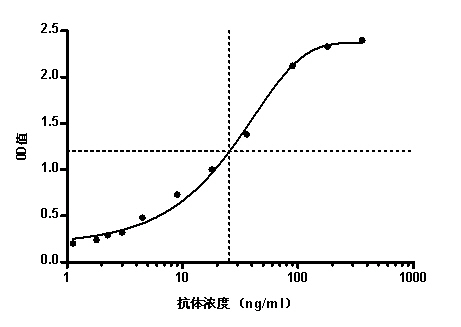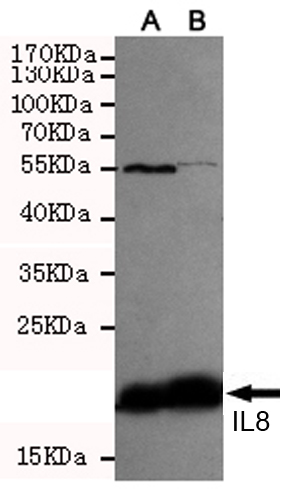-
Product Name
Anti-IL-8 (6E7) Mouse antibody
- Documents
-
Description
IL-8 (6E7) Mouse monoclonal antibody
-
Tested applications
WB, ELISA
-
Species reactivity
Human
-
Alternative names
(Ala-IL-8)77;(Ser-IL-8)72;3 10C;310C;AMCF 1;AMCF1;b ENAP;Bbeta thromboglobulin like protein;Beta thromboglobulin like protein;C-X-C motif chemokine 8;CXC chemokine ligand 8;CXCL 8;CXCL8;Emoctakin;GCP 1;GCP-1;GCP/IL-8 protein I;GCP/IL-8 protein II;GCP/IL-8 antibody
-
Isotype
Mouse IgG2b
-
Preparation
Antigen: Purified recombinant human IL8 protein fragments expressed in E.coli.
-
Clonality
Monoclonal
-
Formulation
Purified mouse monoclonal in PBS(pH 7.4) containing with 0.02% sodium azide and 50% glycerol.
-
Storage instructions
Store at 4°C short term. Store at -20°C long term. Avoid freeze / thaw cycle.
-
Applications
WB: 1/500
-
Validations

Indirect ELISA assay for anti-IL8 mouse mAb.Antigen coating concentration: 8ug/ml.

Western blot detection of IL8 in CHO-K1 transfected by IL8-PDGFR fusion protein cell lysate using IL8 mouse mAb (1:500(A)-1:1000(B) diluted).
-
Background
Swiss-Prot Acc.P10145.The protein encoded by this gene is a member of the CXC chemokine family. This chemokine is one of the major mediators of the inflammatory response. This chemokine is secreted by several cell types. It functions as a chemoattractant, and is also a potent angiogenic factor. This gene is believed to play a role in the pathogenesis of bronchiolitis, a common respiratory tract disease caused by viral infection. This gene and other ten members of the CXC chemokine gene family form a chemokine gene cluster in a region mapped to chromosome 4q.
Related Products / Services
Please note: All products are "FOR RESEARCH USE ONLY AND ARE NOT INTENDED FOR DIAGNOSTIC OR THERAPEUTIC USE"
